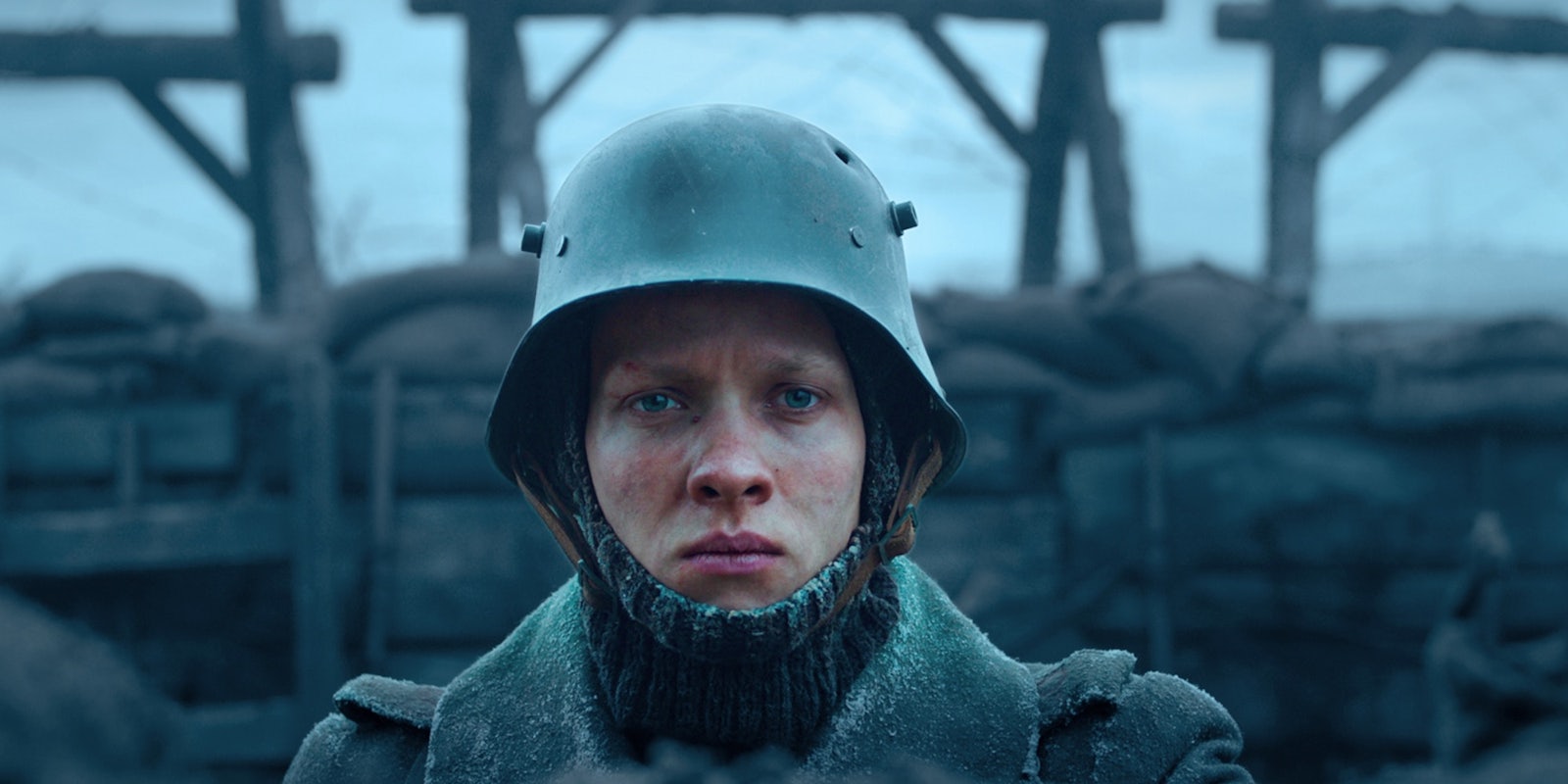Subtlety rarely wins out at the Oscars, and there was no better example this year than the winner for Best Score. Even if you hadn’t seen Edward Berger’s All Quiet on the Western Front, by the end of the Oscar broadcast you were surely familiar with some of its music: An inescapable three-note motif that inspired plenty of snarky comments on Twitter.
Reminiscent of Hans Zimmer, those blaring three-note brrrms could easily belong in a Batman movie, embodying the insidious problem behind All Quiet‘s success: An emphasis on spectacle over subtlety.
With nine nominations and four wins, All Quiet was one of the biggest films of the night; a gritty wartime epic based on Erich Remarque’s 1929 novel about German soldiers during World War I. Adapted twice before, the best-known version is the 1930 film by Lewis Milestone, a genre-defining masterpiece with a fiercely anti-war message. Berger’s film is obviously very different, both stylistically and in terms of the filmmaking technology available to a director in 2022. But modern techniques don’t necessarily translate to more sophisticated storytelling.
I wrote a whole thing comparing these two adaptations and discussing where the new movie falls flat, but the short version is this: While Berger’s All Quiet has been praised for its brutally immersive depiction of trench warfare, it simplifies and de-politicizes the material we see in the 1930 film.
Berger employs blockbuster tactics to present some parts of the story as a nail-biting action thriller—albeit a horrifying one—while downplaying the more nuanced political and emotional elements. For instance, he removes the conflict between soldiers and their civilian families, along with any meaningful exploration of nationalistic propaganda. In fact, the 1930 film’s critique of nationalism is largely replaced by a simplistic subplot about a callous aristocratic general, positioning him as a one-note villain.
On a structural level, Berger’s film also undercuts the emotional journey of its young protagonist, Paul. Instead of following him on a gradual descent from naive, upbeat patriotism to dead-eyed trauma, the film opens with brutal violence and only gives Paul a brief preamble before sending him to the trenches. Berger’s goal is to immerse the viewer in the sensory horror of the battlefield, but this ultimately does a disservice to the story’s deeper political themes.
Volker Bertelmann’s score reflects a similar attitude. With inventive instrumentation and a bold mix of old-school orchestration and more abstract, percussive soundscapes, he ramps up the tension with clattering chills and muscular groans. His promotional interviews also highlight the experimental nature of his work, especially for a prestige historical drama.
The traditional expectation here is for a sweeping, symphonic backdrop. For the music to sound “old-fashioned,” even if it isn’t wedded to a precise historical setting. But Bertelmann comes from an electronic music background and collaborated with the film’s sound designer to incorporate explosions and metallic machine gun fire into the score. That memorable “brrm brrm brrm” motif was created using an antique harmonium (a kind of pump organ) with amps attached, resulting in a sound that The Hollywood Reporter described as “a wooden turn-of-the-last-century synthesizer.” As a music nerd, I honestly find this stuff fascinating. It’s the kind of cool, imaginative little detail that piques people’s interest on the awards circuit. But in the context of the film, the resulting score… absolutely sounds like a blockbuster action thriller.
We’re used to hearing this type of music in films where violence is used for entertainment. It’s Batman-adjacent. So while it may be effective in building tension and creating an explosive impact… is that really what we want for an anti-war drama about the pointless devastation of WWI? Is it placing the audience in the correct mindset?
In some scenes, it’s already hard to differentiate between All Quiet and wartime action movies like Dunkirk and 1917, and the score only helps to hammer this point home. The very things that people praise about this film—the immediacy of the violence, the physicality of the trenches—are part of the reason why it’s less insightful than an adaptation made almost a century ago. We’re invited to empathize with Paul’s fear and trauma, but we’re not really being encouraged to think.



